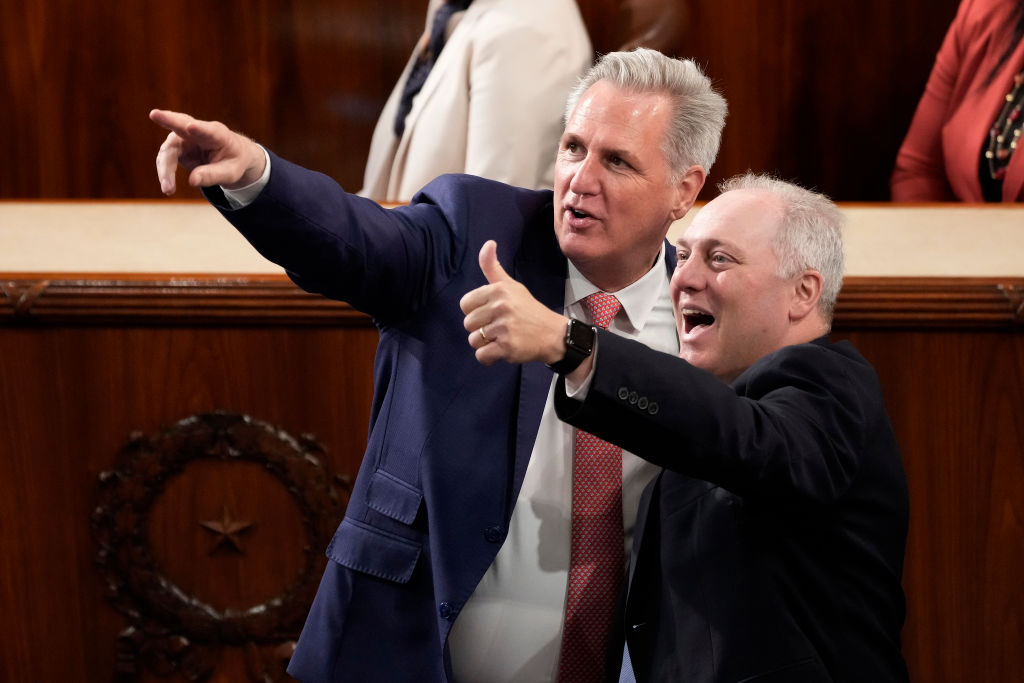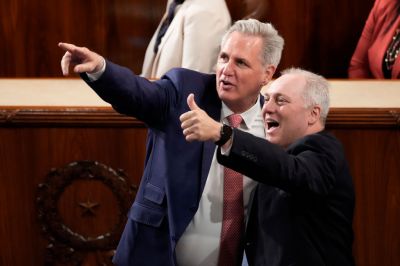House Republicans eked out a crucial win Wednesday by passing a bill to raise the debt limit. Yet the victory has only temporarily eased tensions between the conference’s top two leaders, Speaker Kevin McCarthy and Majority Leader Steve Scalise, as the razor-thin GOP majority looks ahead to more high-stakes challenges.
In the weeks leading up to the successful vote, McCarthy allies have portrayed Scalise, the No. 2 House Republican, as a bit player. News reports with key details of the internal negotiations rarely included Scalise’s name and instead highlighted McCarthy loyalists as consequential figures.
Those in Scalise’s world say such claims mischaracterize the majority leader’s role on a leadership team that overcame tough odds to pass a deal with a narrow GOP majority.
“Steve Scalise is always in the room,” a former senior leadership aide told The Dispatch.
The simmering tension reflects the precarious position McCarthy finds himself in months after surviving a protracted election on the House floor to become speaker. Even Wednesday’s victory is only the first in a series of upcoming tests on the debt ceiling for McCarthy, and any missteps along the way could threaten his position. A longtime member of GOP leadership, Scalise could be an obvious successor if McCarthy’s support evaporates.
For now, the initial win on the debt-ceiling fight has calmed any questions surrounding McCarthy’s job security. But some Republicans who spoke to The Dispatch said that in the days leading up to the bill’s passage, it appeared that McCarthy wanted to downplay the majority leader’s role.
Last month, McCarthy was publicly dismissive of the efforts by a key Scalise ally, Budget Committee Chairman Jodey Arrington, to craft a debt-ceiling offer to take to the White House directly. “I don’t know what he’s talking about,” McCarthy told reporters when asked about Arrington’s planned term sheet. Instead, McCarthy deputized an ally of his own, Rep. Garret Graves of Louisiana, to draft the conference’s bill to raise the debt limit.
But Republicans on and off the Hill were shocked at an April story in the New York Times about McCarthy’s supposed grudge against Arrington. It claimed the speaker was complaining to other members that Scalise was unreliable and “checked out.” Neither McCarthy nor his office denied the claim to the Times.
One person familiar with the relationship between McCarthy and Scalise told The Dispatch that some in the conference see Scalise as “risk averse” in a way that makes him ineffective. Others in the GOP, however, say the characterization of Scalise doesn’t fit with their impressions of the Louisiana Republican.
“The members I’ve talked to think it’s laughable that he’s not effective,” said one Republican lobbyist who previously worked for House GOP leadership.
Asked by The Dispatch about strains in the working relationship, both offices dismissed those concerns and argued the House GOP is unified.
“This tired and erroneous narrative has been debunked by the continued success of the House Republican Conference—including this week's passage of the Limit, Save, Grow Act,” said Mark Bednar, a McCarthy spokesman. “Speaker McCarthy, Leader Scalise, and the entire leadership team has been working in lockstep to ensure House Republicans keep our Commitment to America.”
“[T]hanks to an all hands on deck effort with our entire leadership team and all factions of the conference, we did what no one said we would and passed a historic package that would raise our debt limit by cutting spending and waste,” said Lauren Fine, a spokeswoman for Scalise.
The Times story surprised Scalise’s team, which believed the two leaders’ working relationship had been effective in the majority’s first few months. Scalise has been an active participant in nearly all of the strategic debt ceiling discussions along with Majority Whip Tom Emmer and conference chair Elise Stefanik, according to people close to Scalise. The leadership team has also called on him to whip particularly difficult members on the phone—a practice Scalise regularly performed for more than eight years as the GOP conference whip.
“The majority leader has done great work,” Rep. Kevin Hern, the chairman of the conservative Republican Study Committee, told The Dispatch Wednesday. “Having meetings, holding calls, bringing the caucuses together.”
The clock has been ticking for Congress to raise the debt limit since the federal government hit the current ceiling back in January. Since then the Treasury Department has been using what it calls “extraordinary measures” to pay the bills without issuing new debt—a tactic that will likely work a few more weeks. Republican leadership, including Scalise, concluded that the time crunch meant the House would have to abandon regular order—the process by which committees can amend and pass bills before full House votes. Passing the debt limit, in this view, “belonged” to the speaker, and McCarthy had indeed taken the lead on both internal GOP negotiations as well as prospective talks with the White House.
Nonetheless, many Republicans in Washington noted that it was staunch McCarthy allies like Reps. Graves, Patrick McHenry, and French Hill who appeared to be front-and-center on the debt-ceiling planning team, while Scalise and his friends, like Arrington, either remained in the background or were publicly sidelined.
Some who know both McCarthy and Scalise well say reports of their rocky relations are overblown. “The relationship is not as bad as people think,” said the former senior leadership aide. Hill Republicans say those relations reached a nadir following the GOP defeat in the 2018 midterm elections, when Scalise’s name was floated as a possible challenger to McCarthy as minority leader. (At the time, Scalise publicly said he would not challenge McCarthy.)
The competition, however downplayed, is natural for leaders in a House conference. Reps. Nancy Pelosi and Steny Hoyer had years of tension as Pelosi remained the top House Democrat despite Hoyer’s own designs to be speaker. And the friction between Republican Speaker John Bohener and Majority Leader Eric Cantor during the Obama administration—at times over similar fights about raising the debt ceiling—echoes in the McCarthy-Scalise dynamic.
Much of the tension comes from the different relationships both men have with the House Republican conference as a whole.
“McCarthy has broad but shallow appeal across the conference,” said a second GOP lobbyist. “But Scalise is different. He has more credibility and a deeper well of support.”
Over the years, Scalise has made no secret he would be interested in being speaker one day, but he was also among McCarthy’s most vocal supporters in the run-up to the floor vote this past January. Those familiar with his thinking say he made no effort to present himself as an alternative, even as McCarthy failed to win a majority on ballot after ballot.
But the scar tissue remained from McCarthy’s first failed bid for speaker in 2015, when ideological conservatives took issue with the then-majority leader as being too establishmentarian. McCarthy withdrew from the race after concluding he did not have the votes. In the chaos that followed—and before Paul Ryan emerged as the clear consensus candidate—one name that came up as a potential speaker was Scalise.
Scalise, meanwhile, had approached his early House tenure as a policy-minded ideological conservative. In 2012 he was elected chair of the Republican Study Committee after pressing for a vote of the full group after its founders had selected a different member as its next chairman. In 2014, with McCarthy moving up to the majority leader role, Scalise made the leap into conference leadership by running and winning the race for whip, a position he held for more than eight years—making him the longest-serving House Republican whip in 50 years.
With that pedigree, the case for Scalise as next-in-line for speaker is more compelling than it was in 2015—which makes him, whether intended or not, a threat to McCarthy.
Among the concessions McCarthy made to eventually win the speakership earlier this year was a rule requiring just one member to call for a vote to remove the speaker. It’s why every major hinge point for House Republicans has McCarthy on a knife’s edge, while Scalise appears to be waiting in the wings.
Haley Byrd Wilt contributed to this story.







Please note that we at The Dispatch hold ourselves, our work, and our commenters to a higher standard than other places on the internet. We welcome comments that foster genuine debate or discussion—including comments critical of us or our work—but responses that include ad hominem attacks on fellow Dispatch members or are intended to stoke fear and anger may be moderated.
With your membership, you only have the ability to comment on The Morning Dispatch articles. Consider upgrading to join the conversation everywhere.